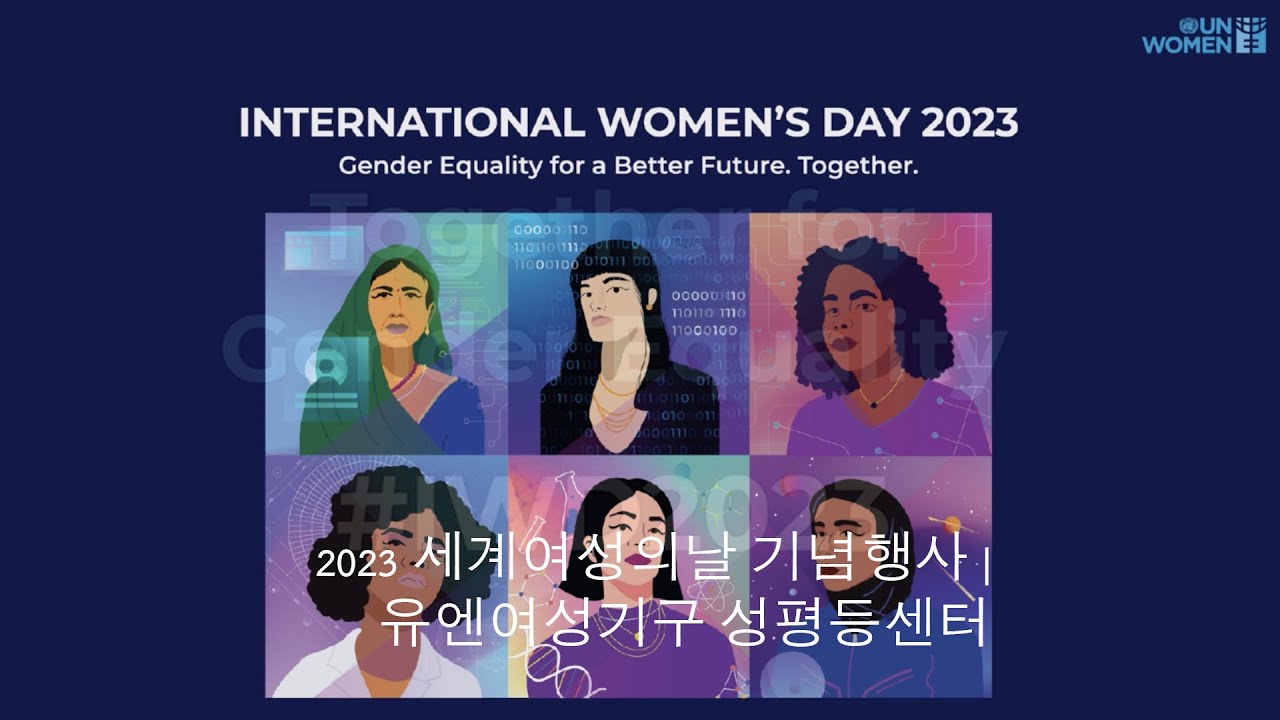Author: Sohee Kim
English | 한국어
“International Women's Day is an important occasion that recognizes the critical contributions of women to our societies, and celebrates the progress we have made in realizing gender equality,” said Jeongshim Lee, director of the UN Women Centre of Excellence for Gender Equality, in her opening speech for the International Women’s Day Commemorative Event held on 8 March. “I sincerely want to thank all of you gathered in this room for taking up the cause to create a world that is just and equitable for all.”
That afternoon, more than 100 attendees gathered at the President Hotel in Seoul, Republic of Korea to celebrate International Women’s Day. They consisted of almost 30 ambassadors, seven regional heads of international organizations, and several gender experts, including Kisoon Lee, the vice minister from the Ministry of Gender Equality and Family.
International Women's Day originates from 8 March 1917, when more than 150,000 women labourers marched through the streets of Russia demanding "bread and roses,” referring to economic and political rights, respectively. Sixty years later, in 1977, the United Nations officially designated this date as International Women's Day.
Although it has been more than 100 years since those women labourers marched the streets, achieving true gender equality could take another 300 years—or even longer, given the current pushback. In order to accelerate this timeline, an international cooperative effort is needed to push back against the pushback to push forward.
With this in mind, international development experts came together in Seoul to celebrate and reinforce the achievements of humanity and to mobilize political will and resources to address global problems. The speakers of the event were some of the Republic of Korea’s top experts on gender equality, including women leaders who have overcome the pushback, and women scientists and education experts who will lead the future.
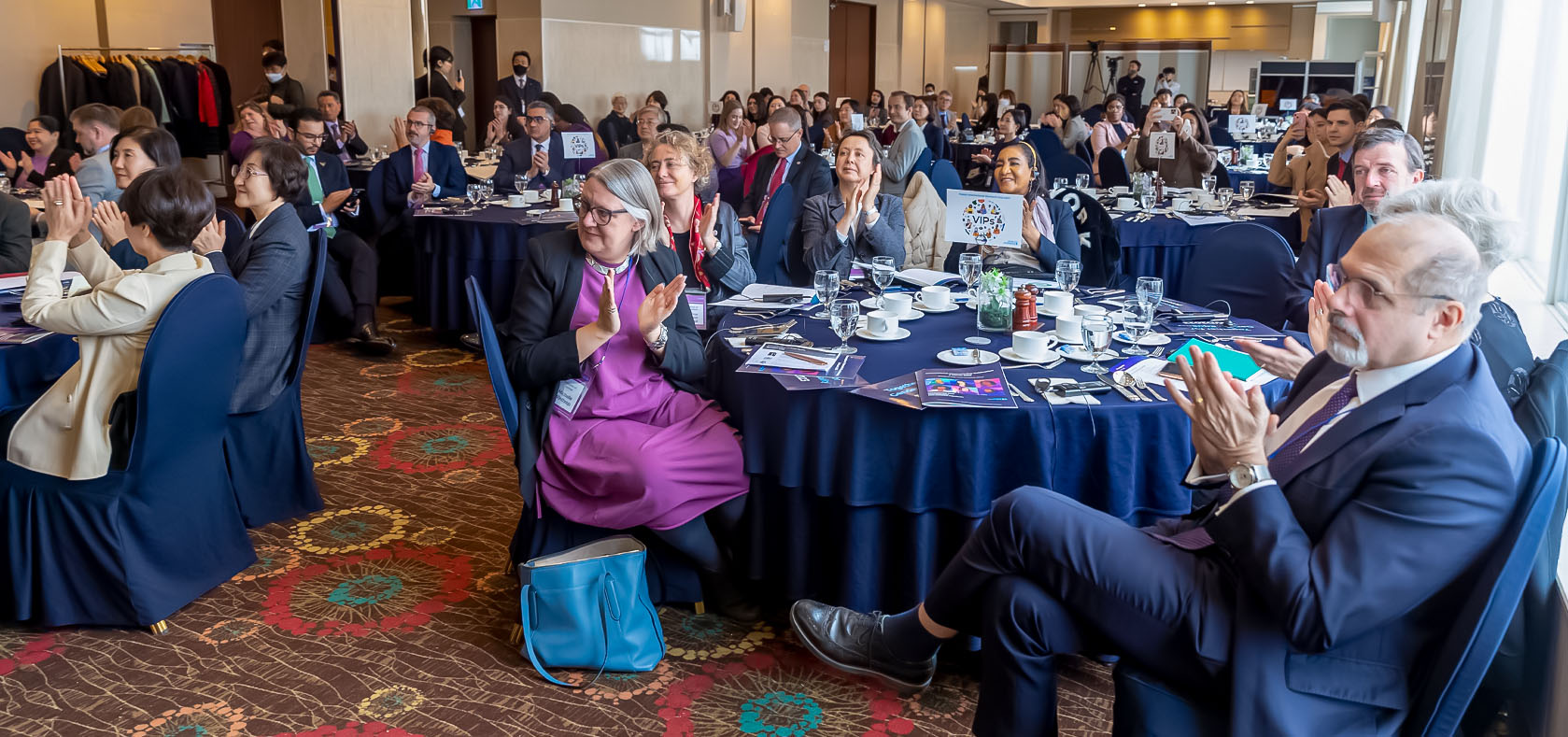
More than 100 international experts gathered at the UN Women Korea's International Women's Day commemorative event at the President Hotel, Seoul on 8 March 2023. Photo: UN Women/Jung Jae-yeon
Progress for gender equality has been painfully slow, even in advanced economies
The event was opened by Oh Jun, chairman of Save the Children Korea and former ambassador of Korea to the United Nations. He started by introducing the history of women's rights over the past century.
"Progress for gender equality has been painfully slow, even in early established democracies, such as the United States and the United Kingdom. The first co-ed college established in the US in 1830, Oberlin, dismissed female students from classes on Mondays to do male students' laundry [until at least 1837]. Students at Lady Margaret Hall of Oxford University in England, the first women’s college there which opened in 1879, were only awarded degrees from the university from 1920.”
Oh explained that continuous efforts have all contributed to gradually increasing the social participation of women, such as the 1945 UN Charter emphasizing ”equal rights for men and women” in the first paragraph, the adoption of the UN's Universal Declaration of Human Rights in 1948, the Convention on the Elimination of All Forms of Discrimination against Women (CEDAW) in 1979, and the establishment of UN Women in 2011.
Results of these efforts include, for example, an increase in the labour participation rate of women in the Republic of Korea from 47 per cent in 1990 to 53 per cent in 2021, according to the Organisation for Economic Co-operation and Development.
However, Oh went on to point out that this improvement does not lead directly to gender equality. “Even in advanced economies, women have a great deal of difficulty maintaining work-life balance and addressing their personal lives in the context of their careers.”
Ehwa Womans University professor Sohn Ji-ae, former chief executive of Arirang International Broadcasting and CNN journalist, conveyed a similar message.
"In every company office, there are mothers in the restroom making whispered phone calls,” she said. “They ask their children if school is over, apologize to their teachers for not preparing their children's belongings properly, and call their own mothers to confirm whether they picked up their children."
Son shared that she was part of this phenomenon. "This was me not so long ago," she said. "The most difficult moment of my career was when I was criticized for sacrificing my children's success and educational opportunities for my own success."
She went on to declare, "Despite this, my biggest success in life is raising and nurturing three children, so my family is also very precious to me. It is unfortunate that young women today, like my past self, must still choose between family and career."
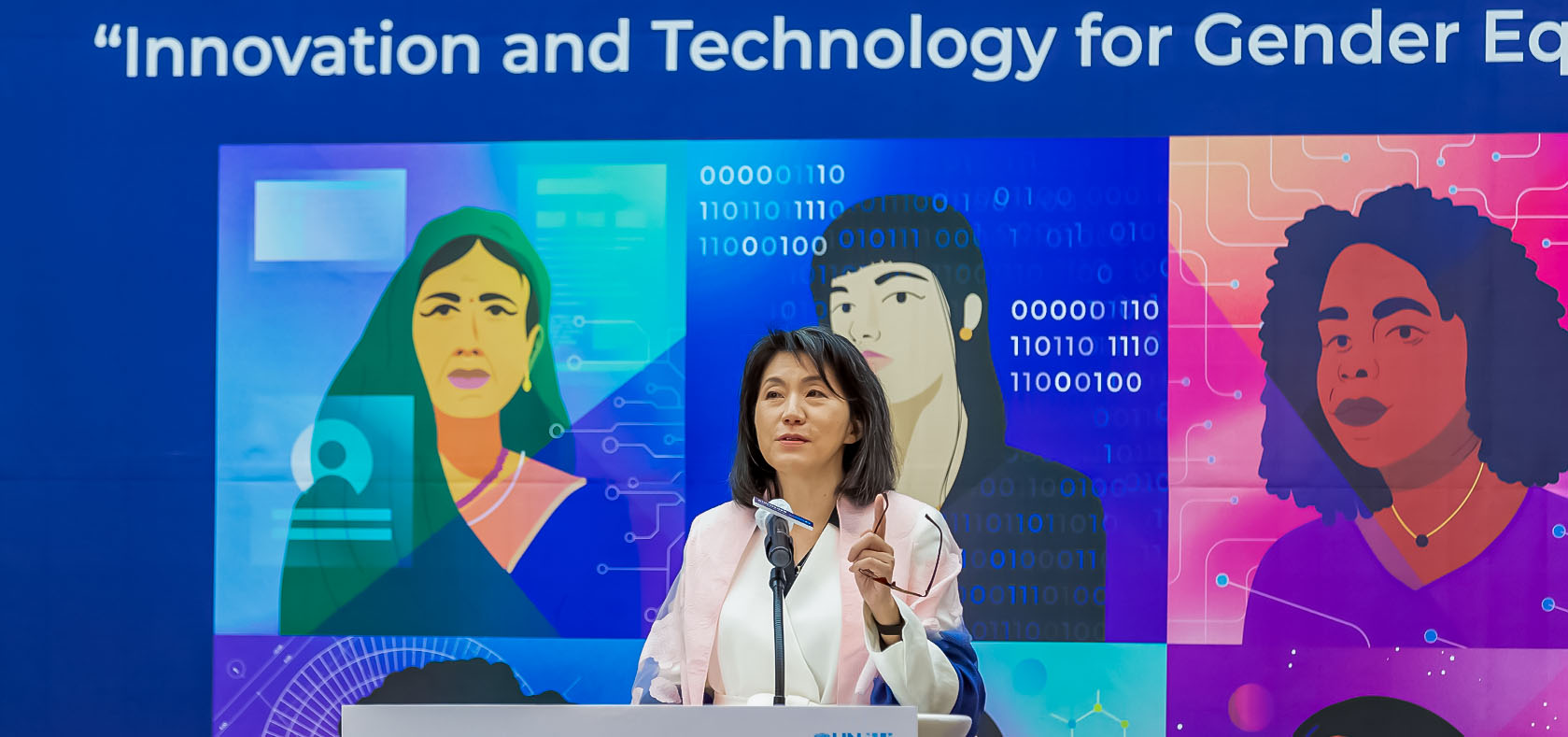
Sohn Ji-ae, Ehwa Womans University professor, stands on the podium and gives a speech. Photo: UN Women/Jeong Jae-yeon
Son pointed out that development for gender equality entails women leading the household and joining the workforce; but for society to still function in that scenario, the system needs to adjust.
“In Korea, the adjustment process is still in the beginning stages and is happening too slowly, in my humble opinion. Korean women are saying, ‘Enough is Enough, we are not carrying both,’ through the act of choosing career over family. You can see that when society moves too slowly and leaves women unprotected, society suffers.”
Her speech aligned with the previous commentary delivered by Oh, where he stated, “The assumption that one side of the married couple works outside while the other side takes care of the home is outdated. We need a new work culture befitting a society where both wife and husband work and take care of home together.”
The next speaker, Yoon Yeo-soon, the first female executive at LG Group, encouraged women by affirming: "When women grow from mid-position managers to leaders, they often struggle because they are evaluated as ‘lacking leadership’, despite being good at the tasks assigned to them. As a matter of fact, unlike sons, we do not educate daughters much about social skills within the family, school, and society."
"Don't aim to fit yourself into the standards created by men,” she advised. “Instead, take it step-by-step, aiming at your own grand visions and dreams."
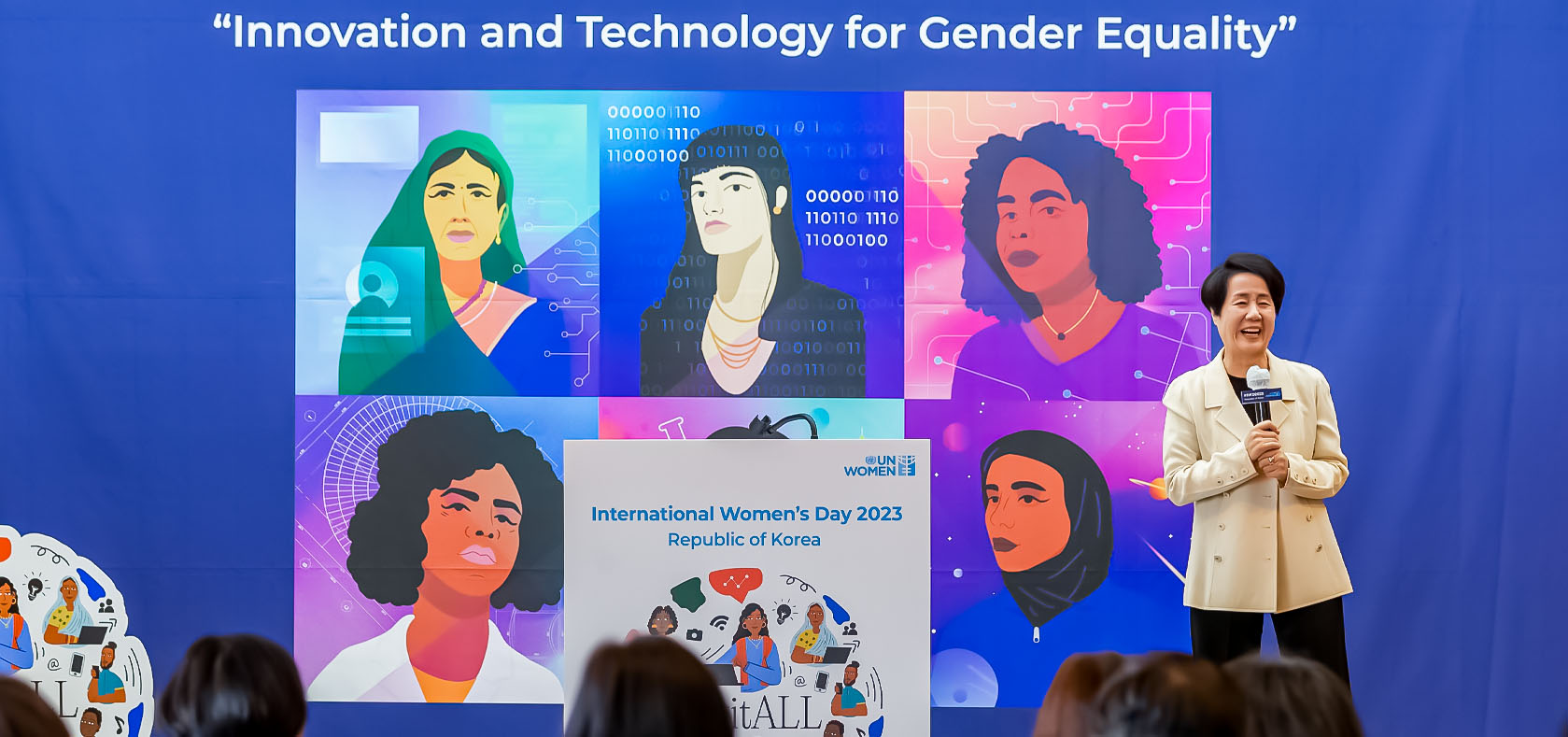
Yuh Soon Yun, Former CEO of the LG Art Center giving a speech. Photo: UN Women/Jeong Jae-yeon
Breaking through the 3 per cent barrier: Increasing women's representation in the STEM sector
The event also held a special session with women experts in innovation, technology and digital education in alignment with this year’s UN theme of International Women’s Day: DigitAll: Technology and Innovation for Gender Equality.
Mun Soo-bok, a professor at the Korea Advanced Institute of Science and Technology, recalled her undergraduate years in the 1980s as one of only 30 female students among 1,000 engineering students at Seoul National University. “I didn’t know that the 3 per cent ratio at the time of college entrance would stay at that number for the rest of my life,” she said. “Women back in those days could not apply to big firms, got paid less even if hired, and were challenged at every opportunity for promotion under the existing systemic discrimination.”
She went on to acknowledge the first-generation women engineers and scientists who contributed to the improvement of women’s representation in the science, technology, engineering and maths (STEM) sector. According to her explanation, the vision and tenacity of those women scientists enabled a fostering environment, which created laws in support of female talents and established female-centred scientists organizations.
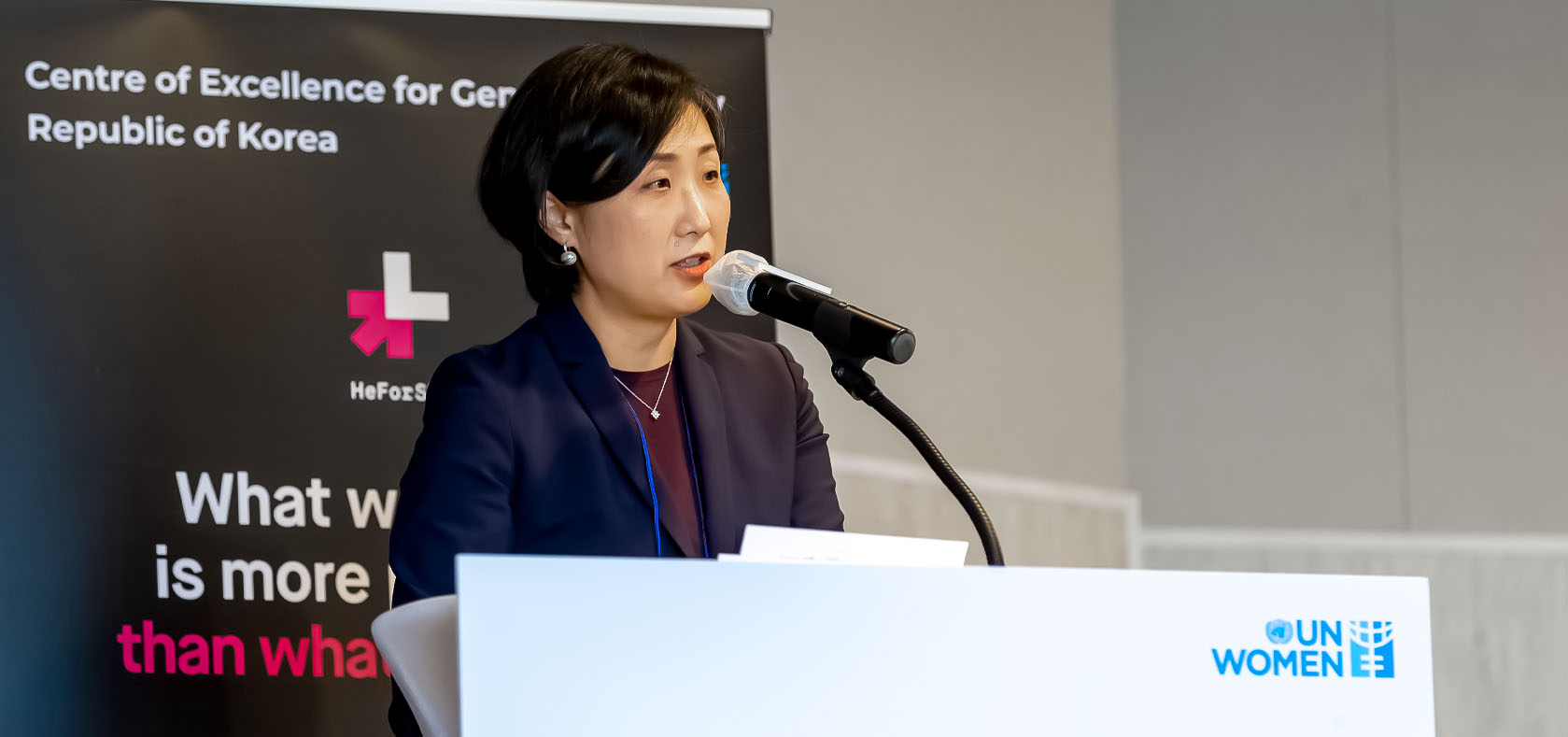
Professor Mun Soo-bok delivering a speech. Photo: UN Women/Jeong Jae-yeon
A central theme of the speeches was that even today, great actions are needed. The next speaker, Soomin Bae, director of KT AI2XL (AI to Everything Lab), suggested strengthening digital education for women and girls, expanding funding and networking opportunities for female scientists and entrepreneurs, and discovering female role models.
Bae also emphasized the importance of gender-responsive technological innovation by showing examples of AI-generated images that mimic the gender stereotypes of society, such as portraying construction workers as male and flight attendants as female. "What if, in the future, AI tools that are in charge of human resources learn from the current gender pay gap and end up paying female employees 30 per cent less than their male counterparts?" she asked.
Last, but not least, Erum Burki, education officer of the UNICEF Pakistan Country Office, presented UNICEF’s digital education programme for girls during COVID-19. To emphasize the importance of adapting to your surroundings in times such as these, Burki stated that: “Useful technology is the one you already have, know how to use, and can afford.”
Following the speeches, UN Women Director Lee presented the speakers with ceremonial awards engrained with the words, "You are a Shining Star for Gender Equality." In the group photo, every participant held up a card with the message, "Together for Gender Equality," symbolizing their commitment to promoting gender equality and empowering women and girls.
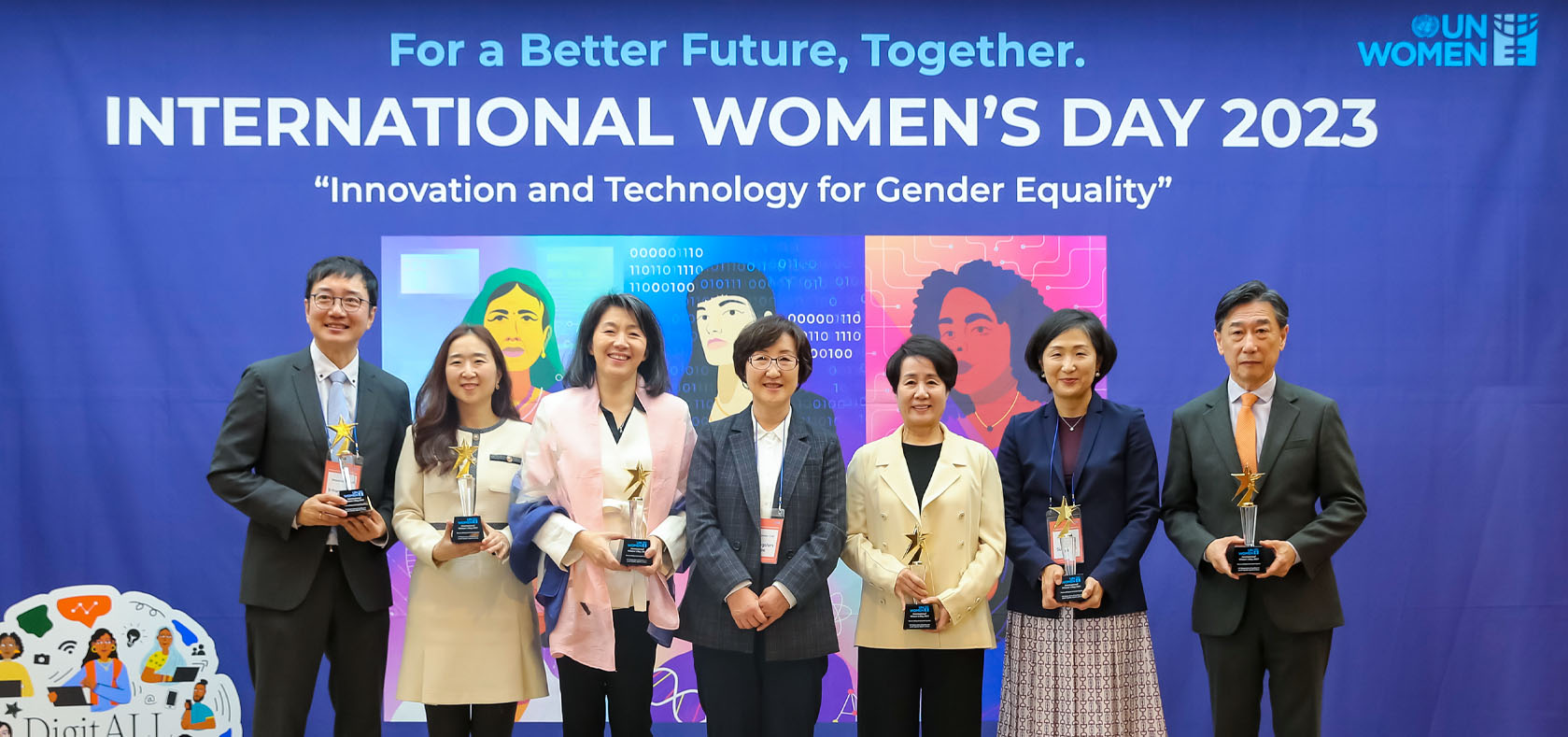
Speakers with Director Jeongshim Lee after receiving appreciation prizes. Photo: UN Women/Jeong Jae-yeon
At the end of the event, the audience watched UN Women’s videos featuring the message of “pushing forward gender equality and empowerment of women and girls by pushing back against the pushback.”
Anne Kari Hansen Ovind, ambassador of Norway to the Republic of Korea, reflected on the effect of the event, saying: “There were many strong women who put forward very good stories and arguments to push forward gender equality."
Joanne Doornewaard, ambassador of the Netherlands to the Republic of Korea, commented: “I show my presence here to support gender equality. I really enjoyed the event because it provided me with meaningful speeches that I could resonate with.”
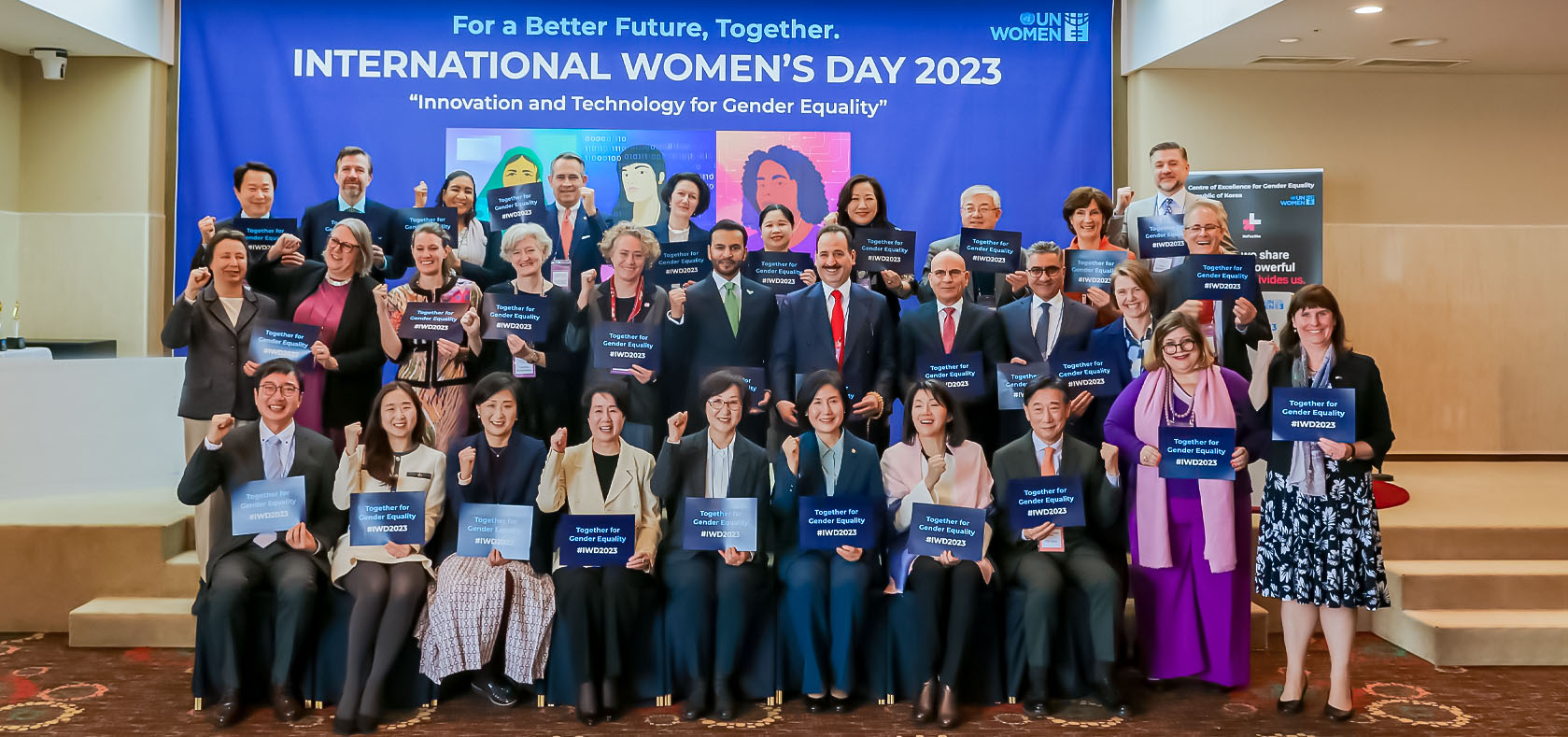
Director Jeongshim Lee, Vice Minister of Gender Equality and Family Ki Soon Lee, ambassadors from more than 30 countries and speakers taking a photo in the event to celebrate International Women's Day. Photo: UN Women/Jeong Jae-yeon
In addition to the speeches, the event featured a charity string quartet performance led by Professor Bae Il-hwan of Ewha Womans University and the chief executive of Beautiful Mind Charity. The quartet performed under the theme of "Peace” in solidarity with the people in Ukraine. Participants, including ambassadors from various countries, showed their solidarity by standing during the performance.






